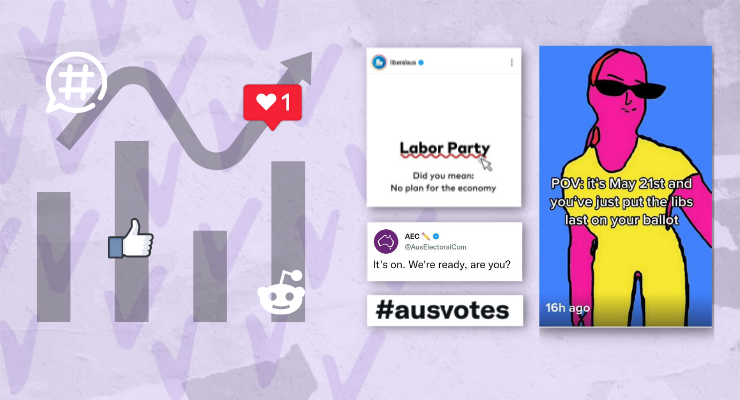
A hectic place during normal times, Australian social media is really going to turn up the heat during the federal election. The best way to confidently follow election results, avoid misinformation and keep your sanity is to stay off social media for the whole of the election campaign. But where’s the fun in that?
The University of Canberra’s Digital News Report 2021 shows that 52% of Australians access much of their news from social media, while for almost a quarter of us, social media is our primary news source. Plus, it’s a big election — and the pull of instant analysis, speculation, memes and #breaking news will surely prove too much for all but the most iron-willed.
So if you’re going to have your head firmly stuck in social media this election, here are a few ways to go about it.
Reddit dubs itself “the front page of the internet” and is basically a network of online communities of interest where members submit content and hold discussions on their topic of choice. These take place in subreddits as mainstream as world news and as bizarre as birds with arms (just photoshopped images of birds… with arms).
The subreddit r/AustralianPolitics is reasonably well-moderated (although they don’t allow articles from sites that have paywalls or political satire — boooooo), but at election time it can get particularly interesting as it holds AMA (Ask Me Anything) sessions with some interesting types. For example, on 11 April, 2022, the Australian Electoral Commission is taking open questions about election processes and procedures.
A lot of the election is going to play out in real time on Twitter, where political journalists, politicians and #auspol enthusiasts converge in one big melting pot of chaos. While the instant news and hot takes can be quite thrilling, it’s important to remember there is an Australia beyond Twitter (thank God).
Keep yourself in check by making sure you follow a bunch of reputable news sources and journos as well as people with very loud opinions. And if something is going absolutely wild on Twitter and you think the whole of Australia is talking about it, cross-check it with what’s trending on Google searches. Nine times out of 10, the number-one trending item on Twitter is not being searched by the majority of Australians — it’s just going nuclear on the app.
When something is really having a big impact on Australians, however, you’ll see that trend spike on Google. (Hint: it’s mostly sport.)
TikTok
Say what you will of Gen Z’s favourite social media platform, it seems to be taking the federal election seriously, announcing in March that it will be launching an in-app Election Guide with the support of the Australian Electoral Commission (AEC). This means any content on the app that references the election will have a little pointer to the AEC’s election guide — which lays out things like “verifying your facts” and “how to enrol” — as well as to its website.
You can find election coverage on TikTok by searching phrases such as “Australian election” — one great account to follow is Guardian Australia’s Matilda Boseley, who offers excellent political coverage. (And oh, look, Crikey also has a fledgling TikTok if you’d like to check it out.)
If you want to know what’s actually going on this election, don’t bother with social media platforms owned by the political parties or their respective leaders. However, if you want to know what they want you to think is going on, head straight over to the Labor and Liberal Instagram pages… and take a huge bowl of salt with you.
On Morrison’s personal Instagram page you’ll be able to find out which minority group he’s trying to butter up each week by taking a look at what he puts on his BBQ. Over at Albanese’s Insta you’ll find plenty of images showing off how good he now looks in a suit.
The best thing about politics on Instagram is accounts that have popped up to offer “digestible” news or explainers about what’s going on in Australian politics. Two accounts to check out are The Daily Aus (“accessible news for young Aussies” — but old Aussies might like it too), Left Right Out (simple explainers of complex political events), and Pyjama Politics, which provides behind-the-scenes takes by Guardian Australia’s Amy Remeikis.
Facebook is notoriously terrible at dealing with elections. It may have its so-called “misinformation filter” in place, but tech think tank Reset Australia has already tested and bypassed Facebook’s advertisement filter, placing egregious misinformation graphics.
It’s also where a whole lot of political advertising dollars go. Thankfully, Facebook’s parent company Meta has the Ad Library, which provides advertising transparency by sharing a searchable collection of all ads currently running on the site. It’s not super easy to use, but it is a trove of interesting information about how much parties are spending, who are they targeting, and what message they are trying to sell them.
The best advice if you’re going to looking for election information on Facebook is to cross-check information with reputable news sites, make sure the information you’re being served isn’t an election ad, and keep the RMIT ABC fact check page up, constantly.
Of course, Crikey has your back on social media this election. Follow our independent election coverage on Twitter, Facebook, Instagram and TikTok.








24 hours of election coverage so far and I’m thinking I might drastically decrease my exposure to Twitter.
Like a room full of angry people yelling at the same time.
In other words, Twitter.
while for almost a quarter of us, social media is our primary news source.
Like gossip delivered as Chinese whispers but even more unreliable.
Easy.
Turn. it. off.